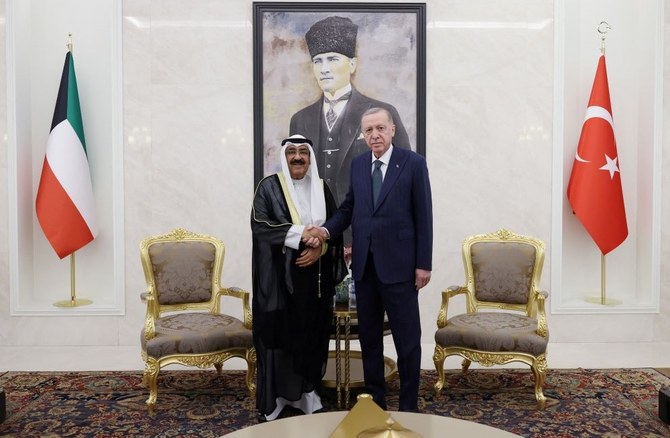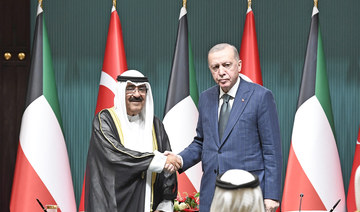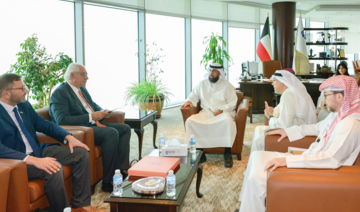ANKARA: Turkiye and Kuwait recently strengthened their bilateral relations by signing six cooperation agreements in the fields of defense, trade, energy, tourism, health and diplomacy during Kuwaiti Emir Sheikh Meshal Al-Ahmad Al-Sabah’s visit to Ankara, where he was received by Turkish President Recep Tayyip Erdogan in a grand state ceremony.
These agreements, including a protocol on defense procurement and a memorandum of understanding on strategic dialogue, followed discussions between the leaders and their delegations.
The visit is significant as it is Sheikh Meshal’s first to a non-Arab country since taking office in December, and coincides with the 60th anniversary of diplomatic relations between Turkiye and Kuwait.
Eyup Ersoy, a visiting fellow in the Department of International Relations at the London School of Economics and Political Science, said that the progress in bilateral relations is bound to have an impact on regional politics.
“There is a recently revived Turkish interest in developing its relations with the states of the region which are keen to adopt a neutral position in the polarized regional geopolitics. Accordingly, there seems to be a cluster of countries in the Middle East that are trying to stay out of the entanglements of regional geopolitics,” he told Arab News.
“With the consolidation of Turkish-Kuwaiti relations, this nonaligned axis is expected to establish itself as a third alternative in the polarized region. In this regard, the signing of a strategic dialogue agreement signifies the commitment of the two states to align their regional policies.”
According to Turkiye’s Ambassador to Kuwait, Tuba Nur Sonmez, who spoke to Kuwait’s state news agency KUNA, the visit included discussions on bilateral relations and regional issues such as the Israel-Hamas conflict.
Both countries aim to increase their trade volume to $1 billion from $688 million last year, with Turkish exports to Kuwait exceeding $583 million last year. In addition, Kuwait sealed a $367 million deal with Turkish drone manufacturer Baykar to buy TB2 armed drones in 2023.
According to Ersoy, the defense industry supply agreement signed during the visit indicates a mutual interest in advancing defense industry cooperation between the two states.
“The content of the actual transactions will be determined by the Kuwaiti leadership’s assessment of Kuwait’s defense industry needs and the extent to which Turkiye could supply relevant defense industry products,” he said.
However, Ersoy said that trade volume between the two countries is not high compared with their other trading partners.
“For example, in 2022, Turkiye ranked 19th among Kuwait’s export destinations, while Kuwait ranked only 56th for Turkish exports,” he said.
“Therefore, both sides are keen to strengthen their trade relations, as indicated by the statement during the visit on the need to revitalize the Joint Economic Commission.
“In addition, Kuwait’s leadership is seeking to diversify its economy in line with its Vision 2035 strategy, as its revenues are almost entirely based on the export of hydrocarbons. Increased trade with Turkiye has the potential to contribute to this ambitious macroeconomic goal,” Ersoy said.
Kuwaiti direct investment flow in Turkiye, which stood at $2 billion last year, has also continued, reaching $1.5 billion so far this year.
“More Kuwaiti participation in the Turkish economy, especially through direct and portfolio investment, is imminent,” said Ersoy.
Kuwait is also expected to take steps to reduce its trade imbalance with Turkiye, he added.
In the tourism sector, Istanbul broke a 10-year record last year with a surge of Gulf tourists visiting the city. Trabzon, Bodrum, and Izmir are other top destinations for Kuwaiti tourists visiting Turkiye during the summer.
However, Arab visitors have been the targets of sporadic attacks amid anti-Arab sentiment in Turkiye. Last year, a Kuwaiti tourist was attacked in the northern city of Trabzon.
Betul Dogan Akkas, an assistant professor of international relations at Ankara University, said bilateral relations between Turkiye and Kuwait were based on mutual respect and trust, stemming from a historical and diplomatic legacy.
“There is capital in these relations to promote cooperation, especially in the economic sphere, including the defense industry,” she told Arab News.
“Kuwait is open to consolidating its trade, and for Ankara, partnerships with Gulf countries are win-win moves both economically and politically.
“The key aspect in analyzing these relations is the current willingness of both sides to build long-term goals. So far, we have seen mostly reactionary or short-term economic and political moves,“ Dogan Akkas said.
“Now is the right time for relations to institutionalize diplomatic capital. This requires leadership support, and both parties have it, as the emir of Kuwait visited Turkiye as his first non-Arab trip.”
Dogan Akkas also believes that the level of success and structure of political decision-making are crucial to strengthening relations.
She said that Turkiye’s ambassador to Kuwait is using her position to “achieve a comprehensive and well-structured long-term goal.”
Another question about this visit is the significance of its timing.
Ersoy believes that the Turkish president’s recent visit to Iraq appears to have eased a source of tension in Gulf politics by demonstrating Ankara’s willingness to cultivate more constructive and cordial relations with a critical neighbor of Kuwait.
“Turkiye’s receptiveness to regional political dialogue and economic prosperity has shaped the Kuwaiti leadership’s assessments in strengthening Kuwait’s ties with Turkiye,” he said.
Kuwait recently showed unease at being left out of the development road project linking Iraq to Turkiye and the Gulf states. During Erdogan’s recent visit to Iraq, Ankara secured the signing of a quadrilateral memorandum of understanding between Iraq, Qatar, the UAE, and Turkiye.
However, the project, which will significantly boost regional transport, will be launched from Iraq’s Faw port, adjacent to Kuwait’s Mubarek port, whose delayed completion has been criticized in Kuwait.
But there was no mention of this unease during the visit to Ankara.
In addition, Ersoy said, national security imperatives appear to have contributed to the recent visit.
“Kuwait’s neutrality in the regional struggle does not guarantee immunity from coercive diplomacy or punitive strategies in a militarized and highly volatile region,” he said.
“Therefore, exploring and building a security partnership with Turkiye appears prudent for the Kuwaiti leadership, which is another reason for the recent high-level visit.”
In this context, Dogan Akkas underlined the importance of the regionalizing their cooperation.
“If Kuwait and Turkiye take their cooperation to a regional or subregional level, as leaders in certain regional affairs, the political capital will be properly implemented,” she said.


























